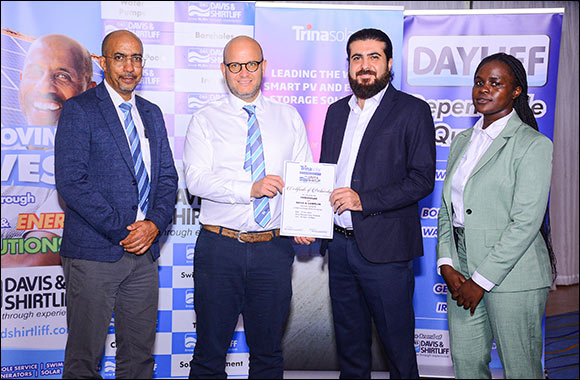Davis & Shirtliff, a leading provider of water and energy solutions in East Africa, has partnered with Trina Solar, a Tier-I global leader in photovoltaic (PV) modules and smart energy solutions. The partnership aims to drive the adoption of solar power across the East African region.
Under this partnership, Davis & Shirtliff (D&S) will distribute Trina Solar's innovative and reliable PV solar panels throughout the region. Ash Pirzadeh, Regional Director for East Africa, from Trina Solar, joined the event to represent the partnership. This initiative is geared towards advancing the transition to energy systems that prioritize sustainability, energy security, and economic growth in East Africa.
D&S and Trina Solar will promote solar adoption through educational campaigns to raise awareness about solar benefits. They will also offer financing options and provide after-sales support and maintenance for the solar products.
'By offering financing options and diversifying our product range, we aim to make solar solutions more accessible and attractive to a wider audience. Additionally, collaborations with government and non-profit entities will enable large-scale solar projects, while community engagement will ensure that solutions are tailored to local needs, fostering sustainable solar adoption across East Africa,' said Henry Davis, Supply Director of Davis & Shirtliff.
Davis & Shirtliff and Trina Solar will play a significant role in deepening access to solar products in East Africa, thereby contributing to energy access, economic development, and environmental sustainability in the region.
'The versatility and scalability of Trina solar modules make them indispensable in the shift towards clean, renewable energy sources. They can be utilized for various applications, from generating power for residential, commercial, and industrial use to powering mini-grids, grid-tied power plants, water pumping, and solar street lighting. This significantly contributes to sustainability, energy security, and global climate mitigation efforts,' said Zhao Lei, Head of Middle East & Africa, Trina Solar.
Solar energy plays a crucial role in Kenya's energy transition, and advancements in solar technology will facilitate progress towards a resilient, efficient, and renewable energy future. The increasing demand for sustainable and reliable energy solutions in Kenya has led to a significant uptick in the adoption of solar products, particularly in rural and peri-urban areas where grid infrastructure is unreliable or absent.
According to the World Bank's latest Kenya Economic Update, approximately 500,000 rural homes were equipped with solar home systems by 2023, with the country selling between 25,000 and 30,000 solar panels annually.
'In addition to government initiatives, partnerships with international organizations and private sector players are driving the solar revolution in East Africa. Innovative financing mechanisms, such as pay-as-you-go solar systems, have made solar energy affordable and accessible to low-income households, further accelerating adoption,' added Mr. Davis.
'As the region continues to embrace solar power, the benefits are manifold: reduced carbon emissions, improved energy access, and enhanced resilience to climate change. Solar panels are not just a symbol of progress; they are a catalyst for change, powering East Africa's journey towards a brighter, more sustainable future.'













